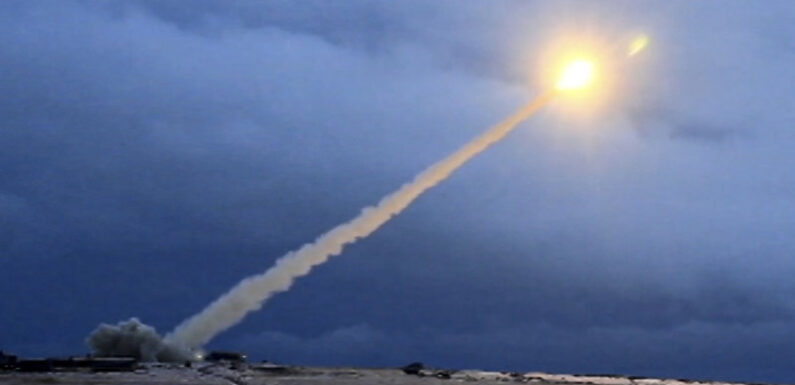
Save articles for later
Add articles to your saved list and come back to them any time.
Moscow: Russian MPs have been given 10 days to work out how best to revoke Moscow’s ratification of a landmark treaty banning nuclear tests, which would hand President Vladimir Putin the option to resume them.
The step is viewed by some Western security analysts as a pointed reminder from Moscow that it still possesses the world’s largest nuclear arsenal at a time when it is locked in a stand-off with the West over Ukraine.
Russia has been developing a new generation of intercontinental nuclear-powered missiles.Credit: AP
A nuclear test by Russia, designed to signal resolve and evoke fear, could encourage others such as the United States or China to follow suit, starting a new nuclear arms race between the big powers that stopped testing in the years after the Soviet Union collapsed in 1991.
Vyacheslav Volodin, the chairman of the State Duma lower house of parliament, discussed the matter with parliamentary leaders on Monday and said revoking ratification would be in the country’s national interest.
He and other parliament bosses gave MPs on the International Affairs Committee until October 18 to study the de-ratification option, according to a statement from the Duma.
Russian President Vladimir Putin would regain the option of nuclear testing in his negotiations with the West.Credit: AP
Russia’s envoy to the Comprehensive Nuclear Test Ban Treaty Organisation (CTBTO) said last week that Moscow would revoke its ratification of the pact, a move that Washington denounced as endangering “the global norm” against nuclear test blasts.
Putin said last week that Russia’s nuclear doctrine – the conditions in which he would press the nuclear button – did not need updating.
However, he said Russia could look at revoking ratification of the Comprehensive Nuclear Test Ban Treaty (CTBT) to bring it into line with the United States, which has signed but not ratified the pact.
CTBTO executive secretary Robert Floyd, an Australian, said Russia’s actions concerned him and that he had been in touch with senior Russian officials to make the case for continued ratification, something he said was in the interests of humanity as a whole.
Floyd had requested a meeting with key leaders in Moscow as soon as possible, he said.
“The CTBTO operates a global monitoring system which can detect a nuclear test explosion anytime, anywhere,” Floyd said in a statement.
Russia’s new Sarmat intercontinental missile is shown at an undisclosed location in Russia in 2018.Credit: AP
“Banning nuclear testing remains essential to preventing the spread of nuclear weapons and to safeguarding current and future generations from the harmful effects of explosive nuclear testing.”
Daryl Kimball, the executive director of the Washington-based Arms Control Association, has warned de-ratification could “take Russia and the world backward to a dangerous era of tit-for-tat nuclear threats”.
The Ukraine war has raised tension between Moscow and Washington to its highest since the Cuban Missile Crisis of 1962, just as China seeks to bolster its nuclear arsenal to match its status as an emerging superpower.
By revoking the ratification, Russia is sending the United States a warning that Moscow can fundamentally change the assumptions of post-Cold War nuclear planning.
Signed by 187 countries and ratified by 178, the CTBT cannot enter into force until eight specific holdouts have signed and ratified it.
The United States, China, Egypt, Iran, and Israel have signed but not ratified it. India, North Korea and Pakistan have not signed.
The Soviet Union last tested in 1990 and the United States in 1992. Russia, which inherited most of the Soviet nuclear arsenal, has never done so. But signs have emerged that testing could resume.
Last month, CNN said satellite images showed growing activity at nuclear test sites in Russia, China and the United States. In 2020, the Washington Post said the then-Trump administration had discussed whether to hold a nuclear test.
Ten nuclear tests have taken place since the CTBT. India and Pakistan conducted two each in 1998, while North Korea held tests in 2006, 2009, 2013, 2016 (twice) and 2017, according to the United Nations.
Reuters
Most Viewed in World
From our partners
Source: Read Full Article


